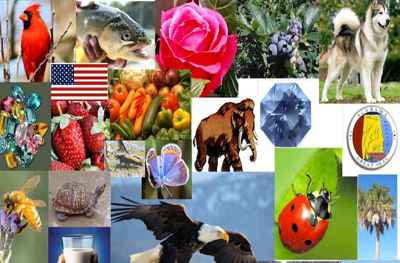
Hawaii Symbols
Hawaii State Aloha Spirit
Adopted in 1986
The Aloha Spirit Law is an existing law "on the books" in Hawai`i. It acknowledges that The Aloha Spirit was the working philosophy of native Hawaiians and was presented as a gift to the people of Hawai`i."
All citizens and government officials of Hawai`i are obligated by law to conduct themselves in accordance with this law, while performing their duties and obligations, as well as in their day-to-day living. Likewise, those visiting our fair islands are expected to conduct themselves in accordance with this Hawaiian law.
Hawaii State Aloha Spirit
Although the Aloha Spirit has permeated Hawaiian culture for hundreds of years, it became somewhat lost after the arrival of missionaries in the late 1700s. King Kamehameha helped bring back a piece of the spirit in the late 1800s- known as the First Hawaiian Renaissance- with the revival of the hula, but Hawai'i became a territory of the United States just a few years after his death, putting the revival on hold.
The 1960s and '70s saw a second Hawaiian Renaissance, when natives realized that tourism had turned their beloved culture into a nightly show that visitors paid to watch. Hawaiians responded with a massive creation of endemic music, dancing, visual art, boat building, and language. The Second Hawaiian Renaissance also touched on politics, with a number of natives wishing to restore Hawaiian independence.
Woven throughout this movement is the Aloha Spirit, never forgotten by the people who created it. One teaching states:
Aloha is being a part of all, and all being a part of me. When there is pain - it is my pain. When there is joy - it is also mine. I respect all that is as part of the Creator and part of me. I will not willfully harm anyone or anything. When food is needed I will take only my need and explain why it is being taken. The earth, the sky, the sea are mine to care for, to cherish and to protect. This is Hawaiian - this is Aloha!
The Aloha Spirit is visible in commerce and government as well. For example, the Hawaiian Businessmen's Association (now the Native Hawaiian Chamber of Commerce) tried to make business culturally relevant through their annual award, which called for "someone who can be successful in business yet still be generous, warm, considerate and caring;" namely, someone who exhibits the Spirit of Aloha.
Hawaii Law
The law designating the Aloha Spirit is found in the Hawai`i Revised Statutes, Volume 1, Chapter 5, Section 5.7.5
Volume 1.
CHAPTER 5. EMBLEMS AND SYMBOLS.
SECTION 5.7.5.
§5-7.5] "Aloha Spirit". (a) "Aloha Spirit" is the coordination of mind and heart within each person. It brings each person to
the self. Each person must think and emote good feelings to others. In the contemplation and presence of the life force, "Aloha", the following
unuhi laula loa may be used:
"Akahai", meaning kindness to be expressed with tenderness; "Lokahi", meaning unity, to be expressed with harmony;
"Oluolu", meaning agreeable, to be expressed with pleasantness;
"Haahaa", meaning humility, to be expressed with modesty;
These are traits of character that express the charm, warmth and sincerity of Hawaii's people. It was the working philosophy of native Hawaiians and
was presented as a gift to the people of Hawaii. "Aloha" is more than a word of greeting or farewell or a salutation. "Aloha" means
mutual regard and affection and extends warmth in caring with no obligation in return. "Aloha" is the essence of relationships in which each
person is important to every other person for collective existence. "Aloha" means to hear what is not said, to see what cannot be seen and
to know the unknowable.
(b) In exercising their power on behalf of the people and in fulfillment of their responsibilities, obligations and service to the people, the legislature,
governor, lieutenant governor, executive officers of each department, the chief justice, associate justices, and judges of the appellate, circuit,
and district courts may contemplate and reside with the life force and give consideration to the "Aloha Spirit". [L 1986, c 202, §1]







